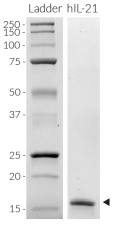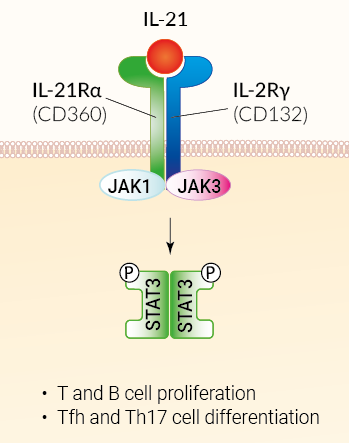Recombinant human IL-21
-
Cat.code:
rcyec-hil21NEW
- Documents
ABOUT
Human IL-21 protein - E. coli-expressed, tag-free, carrier-free
Recombinant human IL-21 is a high-quality and biologically active cytokine, validated using proprietary IL-21 reporter cells. This common γ chain family member is produced in E. coli and thoroughly purified to remove endotoxins.
Recombinant human IL-21 can be used together with HEK-Blue™ IL-21 cells for the screening of inhibitory molecules, such as Avizakimab, a therapeutic monoclonal antibody targeting IL-21 signaling (see figures).
Key features
- Each lot is validated using HEK-Blue™ IL-21 cells
- Endotoxin < 0.01 EU/µg
- 0.2 µm sterile-filtered
Applications
- Standard for IL-21 detection and quantification assays
- Screening and release assays for antibodies blocking IL-21 signaling
- Screening and release assays for engineered IL-21
Interleukin-21 (IL-21) is a secreted cytokine that plays an essential role in promoting the proliferation, development, and differentiation of immune cells. It is referred to as a double-edged sword cytokine, with key roles in anti-tumor and anti-viral responses, but also in promoting the development of autoimmune diseases, including systemic lupus erythematosus and rheumatoid arthritis.
All products are for research use only, and not for human or veterinary use.
SPECIFICATIONS
Specifications
Q9HBE4
100 μg/ml in water
Phosphate buffer saline, 5% saccharose
The absence of bacterial contamination (e.g. lipoproteins and endotoxins) has been confirmed using HEK-Blue™ TLR2 and HEK‑Blue™ TLR4 cells.
Cellular assay
Each lot is functionally tested and validated.
CONTENTS
Contents
-
Product:Recombinant human IL-21
-
Cat code:rcyec-hil21
-
Quantity:10 µg
1.5 ml endotoxin-free water
Shipping & Storage
- Shipping method: Room temperature
- -20 °C
- Avoid repeated freeze-thaw cycles
Storage:
Caution:
Details
Interleukin 21 (IL-21) is a cytokine mainly produced by CD4+ T cells and natural killer T (NKT) cells. It has pleiotropic actions on a wide range of immune (i.e. lymphoid and myeloid populations) and non-immune cell types (i.e. epithelial cells) [1,2]. IL-21 belongs to the common γ chain cytokine family. Its receptor comprises the IL-21Rα (CD360) and IL-2Rγ (CD132) chains and it signals through tyrosine kinases of the Janus family (JAK1 and JAK3) and signal transducer and transcription activators (STAT). STAT3 plays a major role in the biological actions of IL-21, and some functions have been also attributed and suggested for STAT1 and STAT5, respectively [1-3]. Furthermore, IL-21 facilitates the PI3K/AKT and MAPK pathways, which both contribute to IL-21 signal transmission [1-3]. IL-21 is referred to as a double-edged sword cytokine, with key roles in anti-tumor and anti-viral responses, but also in promoting the development of autoimmune diseases (e.g. systemic lupus erythematosus and rheumatoid arthritis) [1-3]. Recombinant IL-21 as well as anti-IL-21 monoclonal antibodies are being investigated for therapeutic use in cancer and autoimmune diseases [1-3].
References:
1. Spolski R. et al., 2014. Interleukin-21: a double-edged sword with therapeutic potential. Nat Rev Drug Discov. 13(5):379-95.
2. Leonard WJ. et al., 2016. IL-21 signaling in immunity. F1000Res. doi: 10.12688/f1000research.7634.1.
3. Long D. et al., 2019. Clinical significance and immunobiology of IL-21 in autoimmunity. J Autoimmunity. 99:1-14.
DOCUMENTS
Documents
Technical Data Sheet
Validation Data Sheet
Safety Data Sheet
Certificate of analysis
Need a CoA ?





